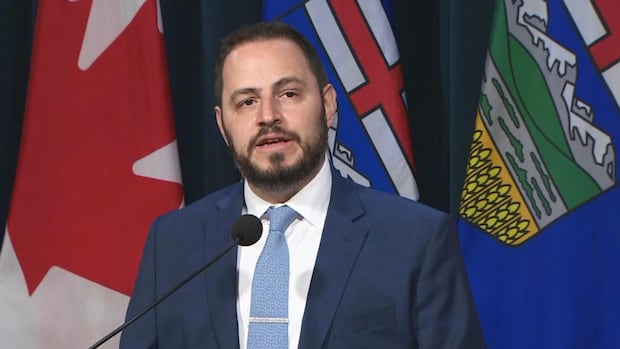Alberta’s revised rules on books in schools will prohibit works containing explicit images of sexual acts, but not written descriptions of the same, according to a new ministerial order published Monday.
The original ministerial order, issued in July, asked school employees to remove library materials that depicted sexual acts, including a “written passage.”
That prompted Edmonton Public Schools to assemble a list of 226 books to remove from shelves and classrooms, including well-known works such as The Handmaid’s Tale, The Color Purple, I Know Why the Caged Bird Sings, The Godfather and Jaws.
The uproar over the school board’s list forced Alberta Education and Childcare Minister Demetrios Nicolaides to last week hit pause to allow government officials to take a second look at the rules.
“We want to ensure that material that has extremely graphic and explicit visual depictions of sexual activities [is] not made available at school libraries,” Nicolaides told reporters Monday.
“That’s been our concern from the very beginning and the updated ministerial order really focuses on that concern.”
The new ministerial order removes “written passage” and adds “visual depiction.”
“Visual depiction means a visual or graphic representation, such as a drawing or painting, an illustration, a photographic or digital image or a video file,” the ministerial order reads.
Books containing graphics of bodies for a non-sexual purpose, such as an anatomy book, are exempt, as are religious texts.
The first clause of the new ministerial order acknowledges the importance of student access to “classic literary works.”
The Edmonton school board listed Atlas Shrugged by Ayn Rand and Brave New World by Aldous Huxley as examples of books that would be banned.
The new order removes any distinctions based on students’ ages, removing a caveat that would have allowed high school students to access “non-explicit sexual content” that vaguely describes a sexual act.
The government also pushed back a deadline for all Alberta schools to comply with the rules, giving them until Jan. 5, 2026, instead of the original Oct. 1 requirement.
However, all school boards, charter and independent schools in Alberta must send the education minister’s office a list of all material they plan to remove from libraries by the end of October.
Nicolaides told reporters this requirement was so the province can provide oversight and guidance to schools, and that the province has no plans to publish the list of removed books.
Nicolaides’ first order took effect July 4, and was prompted by advocacy groups lobbying the minister to remove four graphic novels from schools.
The books, which have also been the subject of some bans in the United States, include depictions of nudity, sexual assault of a child and sex acts.
When CBC News obtained a copy of the Edmonton school board list, and portions of it leaked online last month, board chair Julie Kusiek said division employees were following the province’s rules, and encouraged anyone with concerns to contact the government.
The proposed book ban led to educators, librarians, authors and civil liberties advocates to accuse the Alberta government of censorship.
Alberta Premier Danielle Smith accused the school board of “vicious compliance,” and accused the school board of being overzealous in its application of the rules.
Some teachers, meanwhile, posted pictures of bare or covered classroom bookshelves on social media, saying they didn’t have time at the start of the school year to catalogue their classroom libraries as required.
The new order says schools must let parents know what’s in those classroom libraries. Nicolaides said that doesn’t mean teachers have to prepare a list.
They could snap photos of the collection to share with parents or allow families to peruse the shelves in their classroom, he said.
“We don’t want teachers boxing up their classroom collections,” Nicolaides said.
As before, Alberta schools will still be required to create and maintain a public listing of all literature available – with the exception of teachers’ classroom libraries.
Schools also need to adopt by January a policy for when a student, parent or staff member wants to review literary materials.

